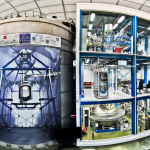
|
XENON1T sets new limits for "WIMPs" - Mainz scientists are among the founding members of the XENON program for the search for dark matter
|
XENON1T continues to collect data until the larger version of the detector currently being prepared is ready for use, for which most components are already designed. With three times more xenon in the time-projection chamber and ten times lower background rate, XENONnT will launch a new phase of dark matter particle search beginning in 2019.
Prof. Dr. Uwe Oberlack from the Johannes Gutenberg University Mainz is one of the founding members of the XENON program on the search for dark matter. The Mainz working group is involved in the XENON experiments in both data analysis and simulations as well as detector technology. Mainz astroparticle physicists are responsible for the muon detector and are involved in the ReStoX xenon storage system and the inner detector. In order to make another leap in sensitivity in the next step with the XENONnT experiment, the group is working on the development of a subdetector for the detection of neutrons. The research is also part of the Cluster of Excellence PRISMA, which is funded by the "Exzellenzinitiative des Bundes und der Länder".
(Plot XENON collaboration)

